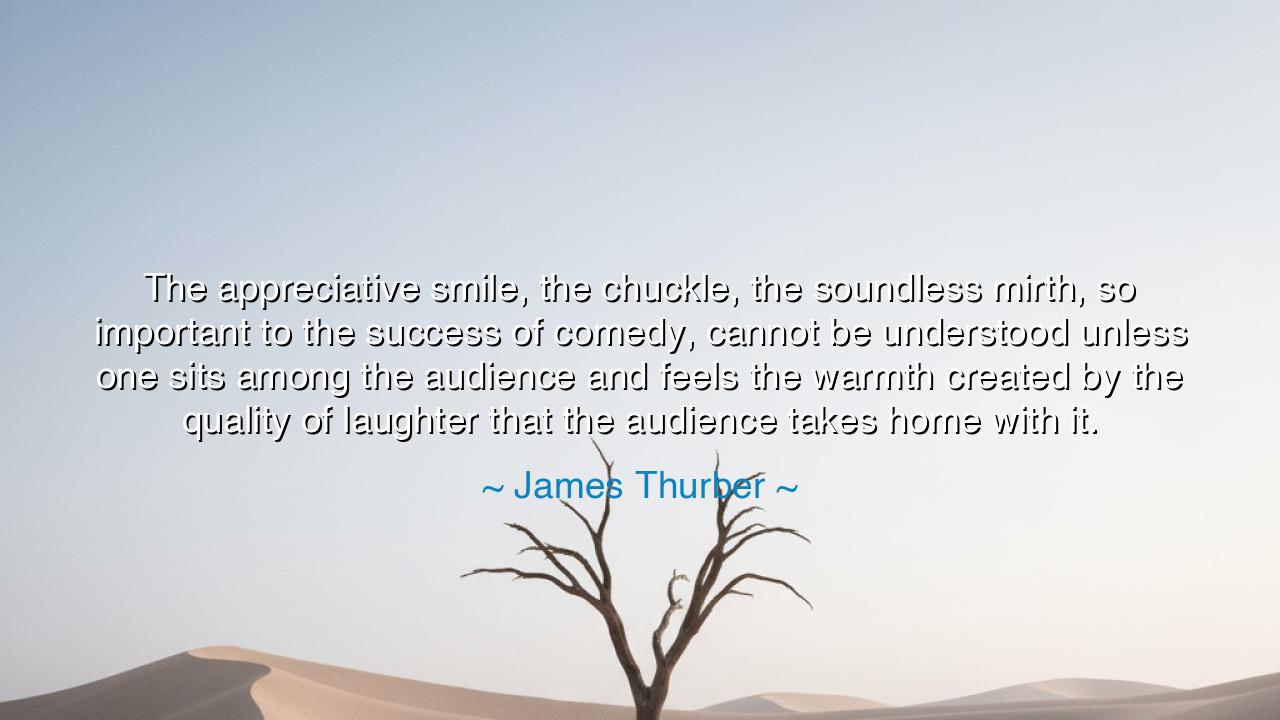
The appreciative smile, the chuckle, the soundless mirth, so
The appreciative smile, the chuckle, the soundless mirth, so important to the success of comedy, cannot be understood unless one sits among the audience and feels the warmth created by the quality of laughter that the audience takes home with it.






Hear the words of James Thurber, who, though a man of wit and keen observation, spoke here with the gravity of a sage: “The appreciative smile, the chuckle, the soundless mirth, so important to the success of comedy, cannot be understood unless one sits among the audience and feels the warmth created by the quality of laughter that the audience takes home with it.” At first, this seems a reflection on theater and jest, but it carries the weight of something greater—the mystery of shared human spirit, of how joy becomes complete only when it is given and received.
For what is a smile in isolation? A fleeting curve of lips, forgotten in a moment. What is a chuckle when heard alone? A sound that fades like a leaf on the wind. Yet when these are woven together in the gathering of people, they become something vast and powerful. A room filled with laughter is a temple of communion, where barriers of class, creed, and sorrow dissolve, and all become one for a time in joy. Thurber knew that the heart of comedy is not the joke itself, but the bond forged when many souls laugh as one.
Recall the plays of Shakespeare, who filled both the royal halls and the crowded pits of London with his stories. The king in velvet and the beggar in rags could both burst into mirth at the fool’s jest. In those shared moments, the divisions of society melted away, and for the span of an evening, all were united. The audience, carrying that warmth homeward, spread it further into their households and streets. Thus comedy was not mere diversion, but an alchemy that transformed solitude into fellowship.
And so, Thurber warns us that to know the power of laughter, one must sit among others, to feel it ripple through a crowd like wind over a field. The solitary scholar who studies a joke in silence cannot taste its true essence. For the essence lies not in the cleverness of words alone, but in the warmth created between hearts, a warmth that lingers long after the stage is dark, carried home as a hidden treasure.
Yet, do not think this truth belongs only to jesters and playwrights. The same is seen in the great speeches of history. When Martin Luther King Jr. cried, “I have a dream,” the crowd did not sit in silence as in a study; they answered with voices, tears, and yes, even smiles of hope. The strength of his words was magnified by the shared audience—their collective spirit making his vision real. This is the same truth that Thurber speaks of: the magic of gathering, the power that is born not in the individual but in the chorus of souls.
Let this be a teaching to you, O seeker: do not live your joys in isolation. Share them. Laugh with others, smile with strangers, gather in fellowship. For a smile given alone fades swiftly, but a smile shared multiplies. A chuckle heard in company becomes a memory that sustains. And laughter, when it unites many, becomes a force that can outlast sorrow and even change the course of nations.
Therefore, go forth and remember: seek not only to consume joy, but to contribute to it. Sit among others, add your smile to their smiles, your laughter to their laughter, and carry the warmth home with you. Be as a torch that is lit in a gathering fire, then carried into the night to spread light where darkness dwells. In this way, you will not only taste joy, but become a maker of it.
Thus Thurber’s words, spoken of comedy, rise to a greater truth: the soul of humanity is not found in solitude, but in communion. And laughter—be it appreciative smile, gentle chuckle, or soundless mirth—is one of the purest bonds we share. Treasure it, practice it, and pass it on, that the warmth may endure.






AAdministratorAdministrator
Welcome, honored guests. Please leave a comment, we will respond soon